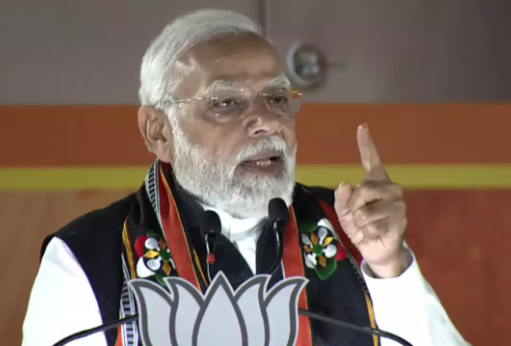
New Delhi: The BJP created history on Thursday by returning to power in three northeastern states – Tripura, Nagaland & Meghalaya – that went to polls recently and managed to keep them under its belt with the help of its allies. While the saffron party created history In Tripura, it swept the polls in Nagaland with the help of its alliance partner NDPP. The BJP is also part of the sweepstakes to form government in Meghalaya having decided to extend support to Chief Minister Conrad Sangma’s National People’s Party which emerged as the single-largest party with 26 seats. BJP and NPP were partners in the outgoing government but had contested the polls separately.
What Does This Victory Mean For BJP And 3 NE States?
BJP`s stellar performance in the assembly polls in the three northeastern states also shows its continued dominance in the region, which was once a Congress stronghold. The outcome means that there will be no change of government in the three northeastern states after the assembly election results were declared by the poll panel on Thursday. Assembly polls in the three states were held last month. Interestingly, a few opposition parties opposed to BJP did relatively better in the northeast assembly bypolls.
However, with this victory, the saffron party has once again proved that it is no longer a party with strong roots in the Hindi heartland only. Thanks to PM Narendra Modi’s continuous focus on the northeast, the majority of Christian and tribal voters here are now more connected with Delhi and the party ruling at the Centre. There is a remarkable change in the perception of northeast voters under the Modi regime, which was not the case during the Congress-led UPA rule.
It may be mentioned that PM Modi has repeatedly said that the ”northeast is neither far from ‘Delhi’ (Dilli) nor his heart (dil)” and, possibly for this reason, the ‘seven sisters’ of the northeast are treated like ‘Ashtalakshmi’ for the ruling BJP since it stormed to power in 2014.
For the Narendra Modi-Amit Shah-powered BJP, seven sister states, which send 25 MPs to Lok Sabha, are not separate states, but an electorally significant big bloc.
Another reason behind the blooming of lotus (BJP’s election symbol) in the northeast is Assam’s firebrand Chief Minister and BJP’s main face in the region – Himanta Biswa Sarma, who is also the head of the crucial North-East Democratic Alliance (NEDA). Himanta – a son of the soil – who joined BJP after a bitter fallout with Rahul Gandhi – and hard-boiled RSS exponent Ram Madhav – are believed to have played a crucial role in expanding and strengthening the saffron party’s footprints in the region.
Taking assembly polls in North-East seriously, the BJP also managed to stitch regional alliances needed to ensure victory just well in time. The BJP’s apparent softening of its stance on the highly controversial Citizenship Amendment Bill (CAB) and its focus on ‘community, land, home’ possibly worked in its favour and struck a chord with the northeast voters.
Further, the construction of the Bogibeel Bridge and several road projects across the region as part of the Modi government’s ‘Act East’ policy also bore rich electoral benefits for the ruling party at the Centre. The Narendra Modi government has sanctioned Rs 1,66,026 crores for building 10,000 km of roads in eight states under the National Highways Infrastructure Development Corporation Limited.
Tripura
The BJP which had created a big splash in the 2018 elections by ousting the Left parties from power in Tripura, returned to power in the state with an absolute majority. Its ally Indigenous People`s Front of Tripura (IPFT) won one seat of the six it contested. Tipra Motha, which fought the polls on its demand for `greater Tipraland` made a mark by winning 13 seats. The Bharatiya Janata Party (BJP) won 32 seats with a vote share of around 39 per cent. The Left parties and Congress had forged an alliance to keep the BJP out of power in the border state but it did not yield results as in West Bengal earlier. CPI-M and Congress are arch-rivals in Kerala. Together polled around 33 per cent votes in Tripura and bagged 14 seats (CPI-M 11, Congress 3). The Left had contested on 47 and Congress on 13 seats. The Left Front had been in power in Tripura for 35 years since 1978. The BJP tally is marginally lower than its number in the 2018 election when it had won 36 seats in Tripura and IPFT had also done well. Chief Minister Manik Saha defeated Congress` Asish Kumar Saha from the Town Bordowali seat by a margin of 1,257 votes.
Nagaland
In Nagaland, BJP secured 12 seats, Nationalist Democratic Progressive Party (NDPP) won 25 seats. Nationalist Congress Party (NCP) bagged seven seats, the National People`s Party (NPP) won five seats, Naga Peoples Front, Lok Janshakti Party (Ram Vilas) and Republican Party of India (Athawale) won two seats each. Nitish Kumar`s Janata Dal (United) got one seat. BJP had earlier won a seat uncontested in the 60-member Nagaland assembly. Nagaland Chief Minister and NDPP candidate Neiphiu Rio won the Northern Angami seat.
Meghalaya
In Meghalaya, the National People`s Party (NPP) led by Chief Minister Conrad Sangma surprised its rivals by winning 26 seats. The party is poised to lead a second successive government in the state. Election was held on 59 seats in the state. United Democratic Party (UDP) bagged 11 seats. Congress won five seats. Trinamool Congress, which had inducted all Congress MLAs in the previous assembly, also got five seats. BJP, People`s Democratic Front and Hill State People`s Democratic Party bagged two seats each. Voice of the People Party got four seats.
Bureau Report
Leave a Reply